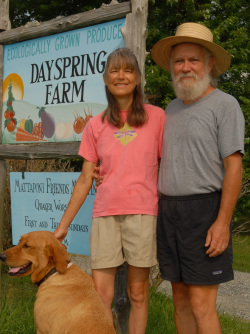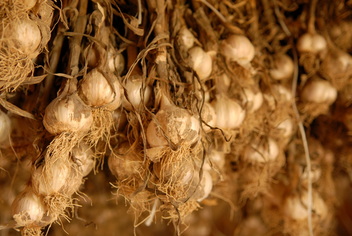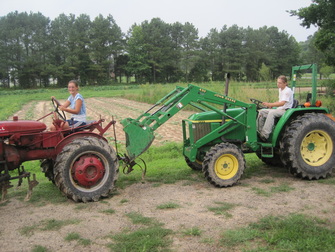
Welcome!

Miriam, Charlie, & Toby
At Dayspring Farm, a bounty of fruits, vegetables and flowers greets each growing season. Savory squashes, leafy greens, heirloom tomatoes and juicy strawberries are grown in healthy soil using practices of natural fertilization and environmentally safe pest control.
We are committed to sustainable agriculture, which treats the farm, the growers and the wider environment as a whole living system. Our aim is to keep the farm in harmony with nature, out of reverence for the land.
Dayspring Farm is located in the beautiful countryside of King and Queen County, an area in Eastern Tidewater Virginia that continues to be primarily agriculturally based. The 18-acre farm is owned by Charlie and Miriam Maloney and their four children. The farm is also home to cats, 2 horses, and a mixed breed dog named Bella.
Today there is a growing call to create a different kind of food system that relies primarily on food grown locally. At Dayspring Farm, we are pleased to be a part of a renewal of small-scale farming.
We are committed to sustainable agriculture, which treats the farm, the growers and the wider environment as a whole living system. Our aim is to keep the farm in harmony with nature, out of reverence for the land.
Dayspring Farm is located in the beautiful countryside of King and Queen County, an area in Eastern Tidewater Virginia that continues to be primarily agriculturally based. The 18-acre farm is owned by Charlie and Miriam Maloney and their four children. The farm is also home to cats, 2 horses, and a mixed breed dog named Bella.
Today there is a growing call to create a different kind of food system that relies primarily on food grown locally. At Dayspring Farm, we are pleased to be a part of a renewal of small-scale farming.
"If you don't know where you're from, you'll have a hard time saying where you're going."
— Wendell Berry

Garlic hanging in the barn
Dayspring Farm was originally started by the Jackson family, comprising of a woman and her mother. The farm house that still is on the property today was built in 1896. At this time the farm consisted of about 100 acres. The farm was then bought by the Trevillions who also farmed the land. George Trevillion also was the county tax collector so people would come to the farm to pay their taxes. When the Maloney's first moved into the farm, it was still commonly referred to as "George's Place" by other locals.
In the 1920s one of the large 40 acre fields was sold to a neighbor. This occurred again in the 1930s, leaving the 18 acres that the Maloney family owns today. Another local had purchased the farm as a second home after moving to Florida to pursue a furniture business. The farm was rented out for about 20 years and was used to farm mainly the commodity crops of corn, soy beans, and wheat.
The Maloneys purchased the farm in 1987. They immediately transitioned into organic farming practices when they moved onto it. In the beginning they farmed only a few acres while renting some land out to others. Gradually, they were able to manage all 18 acres on their own. The current farm uses 14 of the 18 acres for production with 15 different patches.
Charlie is conscious to keep the farm on a family scale and integrates that concept into all the decisions he makes, from the equipment used to the extent of outside work brought in. Over the years, Charlie decreased his pastoral counselling practice to spend more time on the farm, where he started full-time in 2000.
Today, the farm continues to be family centered, with several of the Maloney children still helping. Miriam has moved to working full time on the farm as well. Interns are employed each summer, many of them students or alumni of William and Mary. The farm sells to restaurants in addition to the CSA.
In the 1920s one of the large 40 acre fields was sold to a neighbor. This occurred again in the 1930s, leaving the 18 acres that the Maloney family owns today. Another local had purchased the farm as a second home after moving to Florida to pursue a furniture business. The farm was rented out for about 20 years and was used to farm mainly the commodity crops of corn, soy beans, and wheat.
The Maloneys purchased the farm in 1987. They immediately transitioned into organic farming practices when they moved onto it. In the beginning they farmed only a few acres while renting some land out to others. Gradually, they were able to manage all 18 acres on their own. The current farm uses 14 of the 18 acres for production with 15 different patches.
Charlie is conscious to keep the farm on a family scale and integrates that concept into all the decisions he makes, from the equipment used to the extent of outside work brought in. Over the years, Charlie decreased his pastoral counselling practice to spend more time on the farm, where he started full-time in 2000.
Today, the farm continues to be family centered, with several of the Maloney children still helping. Miriam has moved to working full time on the farm as well. Interns are employed each summer, many of them students or alumni of William and Mary. The farm sells to restaurants in addition to the CSA.
"Dayspring farmers regard building a healthy soil as
the foundation for responsible, sustainable agriculture."
Dayspring Farm operates based off of the principles of good, ecological sustainable agriculture. In accordance with this, the farm uses compost and natural soil amendments for fertilization, cover crops, natural pest control and crop rotation. Dayspring farmers regard building a healthy soil as the foundation for responsible, sustainable agriculture.
More specifically, the farming equipment consists of a John Deere utility tractor, a '53 Farmall Cub tractor, tiller, disc, a water wheel transplanter, mulch layer, walk-behind tiller, BCS Tractor, (Power Harrow, Flail Mower, Rotary Plow, Tiller,) Earthway seeders, Jang seeder, and plenty of hand tools. In addition, specific farm facilities include: 1 large wash, pack, cooler barn (built by Jason Maloney, Tall Pine Builder) 1 irrigation shed, 2 storage sheds, 1 large equipment pole barn , 20 by 48 greenhouse for starting plants; and 5 unheated hoophouses.
Leading pests are Colorado potato beetles, cucumber beetles, and flea beetles. Handpicking, row covers, succession planting and attracting beneficial insects are the primary control strategies. We avoid pest control sprays such as pyrethrum, especially since a neighbor began to keep hives of bees on the farm a couple years ago. We have seen substantial increase in cucurbit pollination with the presence of the bees. We also had a deep well drilled for both the house and the farm. We ran out a main line to the fields and installed 14 faucets around the fields, so that we can now irrigate about half our 16 acres with drip irrigation (mostly drip tubing and emitters, some t-tape).
Though Dayspring Farm follows organic practices, our crops are not USDA Organic certified.
More specifically, the farming equipment consists of a John Deere utility tractor, a '53 Farmall Cub tractor, tiller, disc, a water wheel transplanter, mulch layer, walk-behind tiller, BCS Tractor, (Power Harrow, Flail Mower, Rotary Plow, Tiller,) Earthway seeders, Jang seeder, and plenty of hand tools. In addition, specific farm facilities include: 1 large wash, pack, cooler barn (built by Jason Maloney, Tall Pine Builder) 1 irrigation shed, 2 storage sheds, 1 large equipment pole barn , 20 by 48 greenhouse for starting plants; and 5 unheated hoophouses.
Leading pests are Colorado potato beetles, cucumber beetles, and flea beetles. Handpicking, row covers, succession planting and attracting beneficial insects are the primary control strategies. We avoid pest control sprays such as pyrethrum, especially since a neighbor began to keep hives of bees on the farm a couple years ago. We have seen substantial increase in cucurbit pollination with the presence of the bees. We also had a deep well drilled for both the house and the farm. We ran out a main line to the fields and installed 14 faucets around the fields, so that we can now irrigate about half our 16 acres with drip irrigation (mostly drip tubing and emitters, some t-tape).
Though Dayspring Farm follows organic practices, our crops are not USDA Organic certified.
"Information is like compost; it does no good unless you spread it around.” - Eliot Coleman
Past Grants
- Organic Pest Control of Predators for Summer Squash: Virginia State University (2011 - 2013)
- Growing Ginger in High Tunnels in Virginia: Virginia State University (2011 - 2013)
- Experimented with various mulches for organic tomato production funded by SARE
- Experimented with organic no till practices (2 -yr project) in horticulture production funded by SARE

